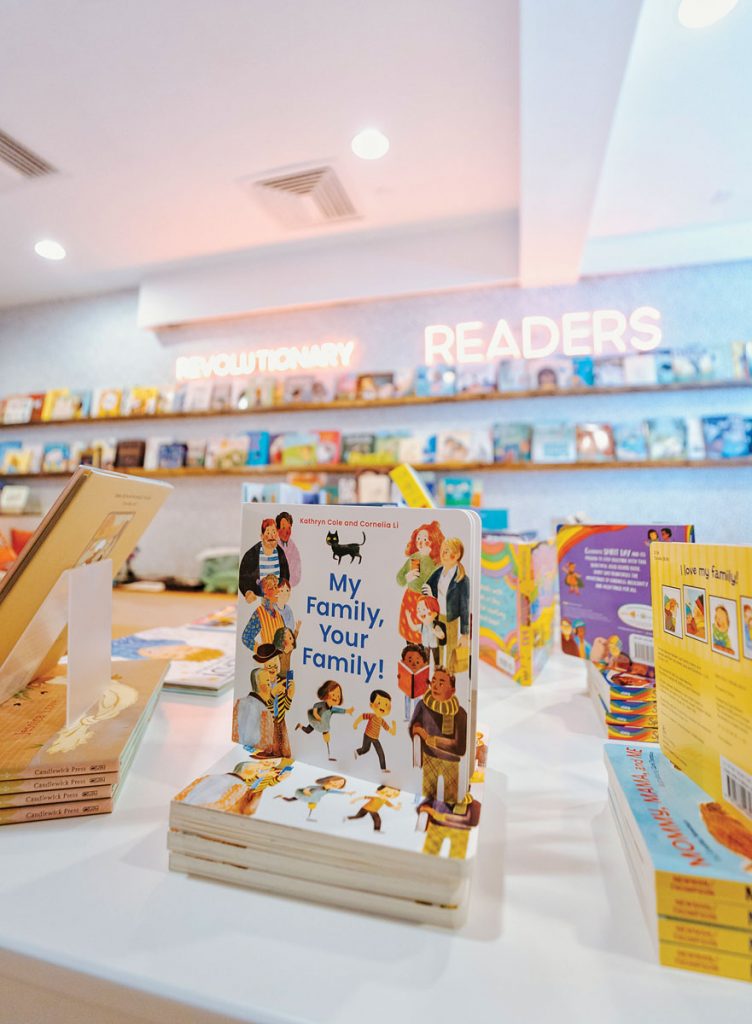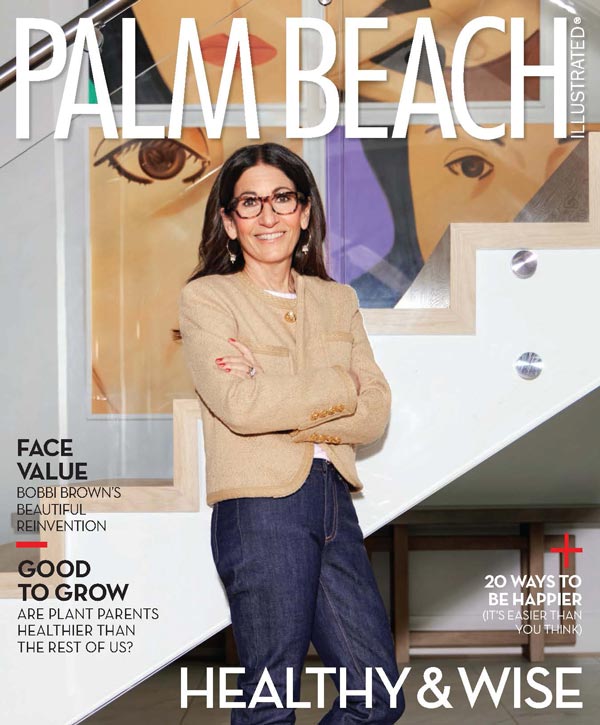
If a space could welcome you with open arms, Rohi’s Readery would do just that. At this children’s bookstore in West Palm Beach’s Rosemary Square, a “Revolutionary Readers” sign blazes in orange neon over shelves lined with books like Ho’onani Hula Warrior, I Am Enough, Curls, Sakamoto’s Swim Club, Chocolate Me!, and Rainbow: A First Book of Pride. Children gaze up at the titles, pull tomes to their chests, and plunk down on stuffed animal–laden nooks or a kid-sized stage. For those who need help sounding out the words, Pranati “Pranoo” Kumar Skomra is there in her signature pin-clad bucket hat. She punctuates the stories with hand gestures as she reads, a tendency inherited from her Konkani ancestors. She’s spent the last decade honing her voices, perfecting her dances, and cementing her passion for educating—and captivating—young readers. Their eyes never leave her.
A teacher, “edupreneur,” and advocate for diversity, inclusion, equity, and accessibility in children’s education, Kumar Skomra has built a space for children that’s a celebration of humanity in its purest form.

Hailing from Hyderabad, India, Kumar Skomra and her parents immigrated to the U.S., her father leading the way to establish a home base for his wife and young daughter in Dallas, Texas. Kumar Skomra’s own time in the American education system was not easy.
“We encountered experiences of oppression and racism, both in professional and educational spaces,” she says. As a student, Kumar Skomra dealt with microaggressions from teachers about the way she spoke as she learned English, encountered difficulties with reading comprehension, and struggled with her sense of belonging as she balanced assimilating into the community and holding onto her culture. “It came at the cost of me feeling unempowered in who I was.”

At home, though, Kumar Skomra witnessed how education could empower children. Her mother taught students from 6 months to 3 years of age, instructing them with a patience, warmth, and love that moved Kumar Skomra. She recalls her mother’s vibrant classrooms, filled with markers, banners, stencils, and other decorations—some of which have even made their way to the Readery. Her mother’s passion inspired her to work with children too. “They possess a never-ending amount of joy,” she says. “They are a true north.”
At the University of Florida, Kumar Skomra earned a bachelor’s degree in integrative biology and a master’s in medical sciences. In her spare time, she volunteered as a counselor at Camp Boggy Creek and the Florida Diabetes Camp, and as a mentor for Take Stock in Children. Motivated by expectation and her childhood dream of becoming a pediatrician, Kumar Skomra started medical school at Ross University, but she quickly realized she wasn’t where she wanted to be. Negative experiences with instructors alienated her from her classmates. She was criticized for writing as if English was her second language and admonished for her approach to memorizing anatomy flashcards. She was publicly told she “wasn’t smart, but was a hard worker.” Kumar Skomra hit a breaking point.
“The aha moment literally happened when I got my white coat,” she recalls. “I didn’t want to be a doctor. I wanted to commit myself to a space that brought me joy and allowed me to learn in ways that felt authentic to me.”

Her true north was calling: She wanted to work with children. She moved to New York, landing at Success Academy Charter Schools in the South Bronx and Harlem, where she coached teachers, wrote pre-K curriculum, and taught students in pre-K through fourth grade. “What started out as a two-month fellowship turned into the rest of my life,” she says.
Eventually, Kumar Skomra helped found Impact Public Schools in Seattle, the region’s first elementary charter school serving immigrant and refugee populations. She built what she calls an “identity-driven school experience” that embeds social-emotional learning into a student’s day—encouraging them to know that their name, language, learning style, clothes, and culture have power, and fostering the kind of acceptance Kumar Skomra longed for as a child.
“Witnessing children and their families be so empowered in their identities made me think about my own experiences,” she says. “Education saved me and gave me the opportunity to learn about myself.”
The pillars of diversity, equity, inclusion, and accessibility (DEIA) informed Kumar Skomra’s curricula—finding ways to use the classroom to bring attention to righting societal wrongs. “DEIA work is so intentional,” she notes. “It became clear that it was the space of education I was the most passionate about.”

Kumar Skomra’s pursuits led her to West Palm Beach, where she founded divHERse Education Consulting to advocate for representation for women of color in educational leadership. After connecting with Path to College founder Christine Sylvain over the “De-colonize Curriculum” shirt Kumar Skomra was sporting at an event, they teamed up to build an organizational system for the fellowship’s curriculum. She also worked with Ricky Aiken’s Inner City Innovators to develop social-emotional messages to fight gun violence.
When the COVID-19 pandemic forced school closures, Kumar Skomra took to social media and YouTube for “Shades of Brown Read Alouds,” sharing books that depict the everyday experiences of minority communities. An idea that had been brewing for years began to take shape.
“I wanted to have a space in which I could unapologetically speak the truths that I wanted to share in my classroom,” she says. “A bookstore is a combination of my favorite things in the world: diverse, inclusive children’s books and a space where children can learn.”

On June 18, Kumar Skomra opened the doors to Rohi’s Readery, South Florida’s first stand-alone social justice–oriented children’s bookstore—offering books that celebrate the stories of Black families, immigrant children, LGBTQIA+ identities, indigenous cultures, Asian and Pacific Islander heritage, Latinx traditions, people with disabilities, and more. Children are free to read and learn about the beauty of their cultures and identities without the lens of oppression. As one visitor pointed out: “This place isn’t political. This is about kids being seen and being loved.”
Rohi’s Readery is named for two important people in Kumar Skomra’s life: her daughter, 11-month-old Rohini Ray Skomra, who oversaw the store’s beginnings from her tummy time mat, and her grandmother, or annama in Hindi. Kumar Skomra’s annama Rohini was a steadfast advocate for children’s education and literacy in India, inspired by the work of freedom fighter and poet Sarojini Naidu, known as the “Nightingale of India.”

Kumar Skomra witnesses this legacy daily at Rohi’s Readery. Families form communities within the store’s walls: Children sit and read together, parents forge friendships. There’s the bustle of children exploring, performing puppet shows, and laughing. But the Readery’s mission goes deeper—ensuring that each child is seen, appreciated, and loved for who they are. A photo of annama Rohini sits behind the register to watch over it all, anchoring Kumar Skomra to this purpose, and reminding her that she belongs here, too.
The Readery isn’t just for kids. Adults have been known to browse the books that line the shelves. They settle into child-sized chairs, their elbows perched on their knees as they flip through the pages. For some, it’s the first time they’ve seen their own narratives in a children’s book. “Hopefully there’s a story here that connects with everyone, whether it’s about them, someone they care about, or someone they’ve been wanting to learn more about,” Kumar Skomra says. What she’s created is a sacred space where everyone belongs and where children of all creeds (and all ages) can sit down with a book and find a face like theirs looking back at them.










Facebook Comments